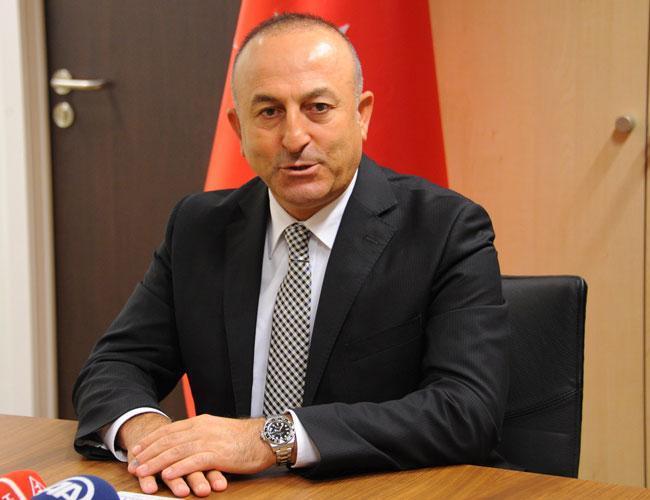
Turkey has said it will retaliate if the U.S. halts sales of new generation F-35 fighter jets in reaction to the Turkish government’s purchase of S-400 anti-ballistic missile systems from Russia.
“It’s not right for them to speak with us in a threatening way. If they take such a step at a moment when we are trying to mend our bilateral ties, they will sure get a response from Turkey. There no longer is the old Turkey,” Foreign Minister Mevlüt Çavuşoğlu told the private broadcaster CNN Türk in an interview on May 6.
“We told the U.S. about our response. I told this to the U.S. secretary of state [Mike Pompeo] in our meeting in Brussels,” Çavuşoğlu said.
The Turkish foreign minister’s statement came in response to a question about recent moves at the U.S. Congress that called on the U.S. government to sanction Turkey because of its growing ties with Russia particularly after its procurement of the S-400 air defense system.
“They should not question our good ties with Russia. The West should abandon this understanding. Countries in this geography have to pursue a balanced policy. Our NATO membership is not an obstacle for us to establish good ties with other countries. No one can argue that Turkey is seeking an alternative to its NATO membership,” he said.
The U.S. has to understand that it can no longer impose its own policies on other countries in the world and cannot sanction countries unilaterally, Çavuşoğlu stressed.
“There is the U.N. and other international organizations. All countries have to abide with resolutions taken by these organizations. But I am not obliged to approve decisions taken by an individual country. Therefore, U.S.’s attempt to impose sanctions on us is illogical and wrong. I would retaliate [in this case],” he said.
“What will happen then?” he said. “If the U.S. imposes sanctions or takes a step in this direction, Turkey will absolutely respond to this. But this is not something we wish. Why should it happen? Thus, the U.S. should give up this approach.”
Turkey needs to protect its citizens and defend its airspace but the U.S. hesitated to sell its Patriot systems, Çavuşoğlu recalled, underlining that threatening Turkey with sanctions was not befitting an ally.
S-400s will be under Turkey’s control
One of the most important concerns voiced in NATO about the Turkish deployment of a non-NATO system on its soils is that it would create an important loophole on the allied joint collective defense.
Reiterating that the S-400s will not be integrated with the NATO radars and systems, Çavuşoğlu stated that the sophisticated air defense systems will be controlled by the Turkish military and will not in anyway target NATO members as the enemy.
“We are already very sensitive on this. Not any defense system, not any weapon I procure or produce in Turkey can and will identify NATO members as the enemy,” he said.
FM to meet Pompeo in May
Çavuşoğlu and Pompeo held their first meeting on the margins of a NATO summit in Brussels in late April with an agreement to come together immediately in Washington D.C. The minister said he will either visit Washington D.C. before May 11 or after May 15 as he will accompany President Recep Tayyip Erdoğan on a visit to London between these days.
The meeting of the two foreign ministers will focus on an initial agreement over a road map on how Turkey and the U.S. will coordinate its actions in Syria in a bid to avoid future tension because of the latter’s partnership with the People’s Protection Units (YPG) in the fight against the Islamic State of Iraq and the Levant (ISIL).
“I have observed that U.S. authorities are also determined in the approval of this road map. We have received the invitation [for a visit to U.S.] right after the meeting [in Brussels]. This can constitute a venue for the normalization of our relations but we still have expectations from the U.S.,” the minister stated.
The said road map stipulates the withdrawal of the YPG from Manbij in a certain timeline and outlines how and by whom all these areas will be controlled.
US’ Jerusalem move can escalate tension
One other issue Çavuşoğlu expressed Turkey’s views and concerns on is the U.S. decision to remove its embassy from Tel Aviv to Jerusalem and to implement this on May 14 on the occasion of the 70th anniversary of the foundation of the Israeli state.
“We wish that this decision will not be implemented. This is a decision which the EU is also against,” he said, calling on Washington not to insist on it. “This move would escalate the tension in the region and de-stabilize. It would annoy Israel, Palestine and all of us,” he added.
Another important decision by the U.S. is expected to be given on May 12 about the fate of the nuclear deal between the world powers and Iran. U.S. President Donald Trump has long been arguing that it was a very bad deal and that U.S. will withdraw from it despite strong rejections from prominent Western countries.
“We, as Turkey, want the continuation of the agreement. But if the agreement would be amended, it should be done through consensus. We are ready to contribute,” Çavuşoğlu said, but repeating that Turkey wants the continuation of the deal.